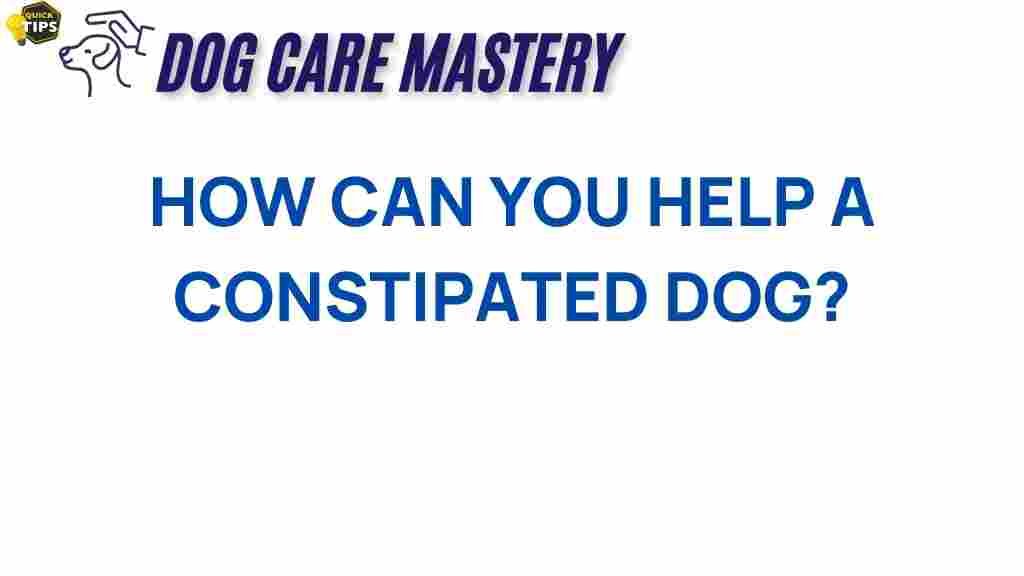Unraveling the Mystery: How Can You Help a Constipated Dog?
As a dog owner, it’s essential to be aware of your furry friend’s health, especially when it comes to their digestive system. One common issue that can affect dogs is constipation. A constipated dog can be uncomfortable and may exhibit signs of distress. Understanding how to help your constipated dog is crucial for their well-being. In this article, we will delve into the causes of constipation in dogs, effective remedies, and when to seek veterinary help.
Understanding Canine Constipation
Constipation in dogs occurs when they have difficulty passing stool, resulting in infrequent and hard bowel movements. It can be a sign of underlying health issues or simply a result of dietary habits. Recognizing the symptoms of a constipated dog is the first step in addressing the problem.
Symptoms of a Constipated Dog
Identifying a constipated dog may involve observing several symptoms, including:
- Straining or discomfort while trying to defecate
- Abdominal bloating or pain
- Loss of appetite
- Lethargy or decreased activity
- Dry, hard stools or no stools at all
Common Causes of Constipation in Dogs
Understanding the potential causes of constipation can help you prevent and manage this condition effectively. Some common causes include:
- Dehydration: Insufficient water intake can lead to hard stools.
- Lack of fiber: A low-fiber diet may hinder normal bowel movements.
- Inactivity: Lack of exercise can slow down the digestive system.
- Obstructions: Foreign objects or tumors can block the intestines.
- Medications: Some medications may have side effects that contribute to constipation.
Effective Remedies for a Constipated Dog
When your dog is experiencing constipation, there are several remedies you can try at home to alleviate their discomfort. Follow these steps to help your constipated dog:
1. Increase Water Intake
Ensure your dog has access to fresh, clean water at all times. Increasing their water consumption can help soften their stool and promote regular bowel movements.
2. Dietary Adjustments
Consider adding more fiber to your dog’s diet. This can be achieved by:
- Incorporating canned pumpkin (not the spiced pie filling) into their meals.
- Introducing high-fiber dog food or mixing in some cooked vegetables like green beans or carrots.
- Using fiber supplements that are safe for dogs.
3. Regular Exercise
Encourage regular physical activity to stimulate your dog’s digestive system. Take your dog for daily walks or engage them in play to promote bowel movements.
4. Massage the Abdomen
Gentle abdominal massage can help stimulate your dog’s intestines. Use your fingers to make circular motions on their belly, which may help relieve constipation.
5. Use Natural Laxatives
Some natural laxatives can help relieve constipation in dogs. However, always consult your veterinarian before trying any new remedies. Options may include:
- Olive oil: A small amount can lubricate the intestines.
- Coconut oil: This can also help ease digestion.
6. Monitor Their Condition
Keep an eye on your dog’s bowel movements. If they do not improve within a day or two, or if their condition worsens, it’s time to consult with a veterinarian.
Troubleshooting Tips for a Constipated Dog
Sometimes, despite your best efforts, your dog may continue to experience constipation. Here are some troubleshooting tips to consider:
1. Check for Underlying Health Issues
Constipation can sometimes indicate more severe health problems, such as:
- Intestinal blockages
- Hypothyroidism
- Neurological disorders
If your constipated dog shows other concerning symptoms, it’s vital to have them examined by a veterinarian.
2. Review Their Medication
Some medications can cause constipation as a side effect. If your dog is on medication, discuss this with your veterinarian to see if adjustments are necessary.
3. Consider Dietary Sensitivities
Some dogs may have sensitivities to certain ingredients in their food, which could lead to digestive issues. If you suspect this, consult with your vet about switching to a hypoallergenic diet.
4. Avoid Home Remedies Without Consultation
While some home remedies can be effective, it’s crucial to consult your veterinarian before trying them. Some substances can be harmful to dogs.
5. Regular Check-Ups
Regular veterinary check-ups can help identify potential health issues before they become significant problems. Discuss your dog’s digestive health during these visits.
When to Seek Veterinary Help
If your constipated dog shows any of the following symptoms, it’s essential to seek veterinary help promptly:
- Vomiting
- Severe abdominal pain or bloating
- Blood in the stool
- Persistent constipation that lasts more than 48 hours
- Loss of appetite for more than a day
Veterinarians may perform examinations and diagnostic tests to determine the underlying cause of constipation and provide appropriate treatment.
Conclusion
Helping a constipated dog can be a straightforward process if you understand the causes and remedies available. By ensuring adequate hydration, making dietary adjustments, promoting exercise, and monitoring their condition, you can significantly improve your dog’s digestive health. However, don’t hesitate to contact your veterinarian if you notice persistent issues or additional symptoms. Your dog’s comfort and well-being should always be your priority.
For more information on dog health and wellness, check out this comprehensive guide. Additionally, if you’re interested in learning more about common pet health issues, visit PetMD.
This article is in the category Health and created by dogcaremastery Team
